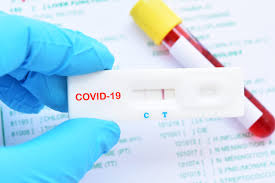What is Antibody Detection?

Antibody tests involve analysing a patient’s sample (usually blood) for the presence or absence of a particular antibody (qualitative) or for the amount of antibody that is present (quantitative). Antibodies are part of the body’s immune system. They are immunoglobulin proteins that help protect people against microscopic invaders such as viruses, bacteria, chemicals, or toxins.
Each antibody that is produced is unique. It is created to recognise a specific structure on an invading foreign cell or particle. The specific structure that is recognised is called an antigen. Antibodies attach to the antigens, creating antigen-antibody complexes (immune complexes) that serve as signals for the rest of the immune system to destroy the cell or particle. There are five different classes of immunoglobulins (IgM, IgG, IgE, IgA, and IgD). The three most frequently measured are IgM, IgG, and IgE. IgM and IgG antibodies work together to produce short-term and long-term protection against infection. IgE antibodies are primarily associated with allergies in the western world, though are also involved in parasite immunology and elimination.
- Disposable Medical Face Masks with Elastic Ear Loop 3 Ply Breathable and Comfortable
- Disposal Protective Clothing for Medical Use
- N95/KN95 Protective Mask with Elastic Ear Loop
- Surgical Mask with Elastic Ear Loop 3 Ply Breathable and Comfortable
- ZeroVirus Space Portable Sterilization Bar
The first time someone is exposed to a foreign substance, like a virus or bacterium, it may take the immune system up to two weeks to make an antibody blueprint and to produce enough of a specific antibody to fight the infection. This initial response consists primarily of IgM antibodies. Several weeks later, usually after the immediate threat has passed and the infection has resolved, the body creates IgG antibodies. It remembers the blueprint for fighting this microorganism and maintains a small supply of antibodies (a mixture of both IgM and IgG). The next time the body is exposed to the same foreign substance, it will respond much more strongly and quickly, to provide primarily IgG antibody protection.
Antibodies are proteins that the body’s white blood cells produce to fight an infection. They bind to a virus, preventing it from infecting a cell, and can remain in blood long after the infection clears. Antibody tests are commonly used to test for exposure to other viruses.
Antibody tests look to see if someone has been exposed to a specific antigen, like a virus. The British tests are designed to work in one of two ways. They either detect human antibodies in blood using an antigen designed to be similar to a feature of the virus. Or conversely, the test detects the virus in blood using a [human-made] antibody designed to trap the virus.
Sometimes a person’s immune system may respond to foreign substances that represent no threat and typically do not generate immune reactions in most people. Such responses are termed allergies (or hypersensitivities) and involve generation of IgE antibodies. The foreign substances that trigger allergic reactions include foods, drugs, pollens, moulds, and animal dander. There are many different types of allergies, and allergic reactions may vary from mild irritations to severe life-threatening responses.
Part of the immune response to infection is the production of antibodies including IgM and IgG. These can be used to detect infection in individuals starting 7 days or so after the onset of symptoms, to determine immunity, and in population surveillance.
A blood test to detect antibodies is being developed as of March 9, 2020. It will allow the determination of whether a person has ever been infected and will work regardless of whether the person developed symptoms. It is hoped that it can return results in 15 minutes by detecting both IgM and IgG antibodies.
The page is keep updating.
And meanwhile, if you have requirement of Nucleic Acid Detection Kit for COVID-19, please click below link to contact us for more details. We will help you or your organization to find qualified product with good quality from Chinese market.

